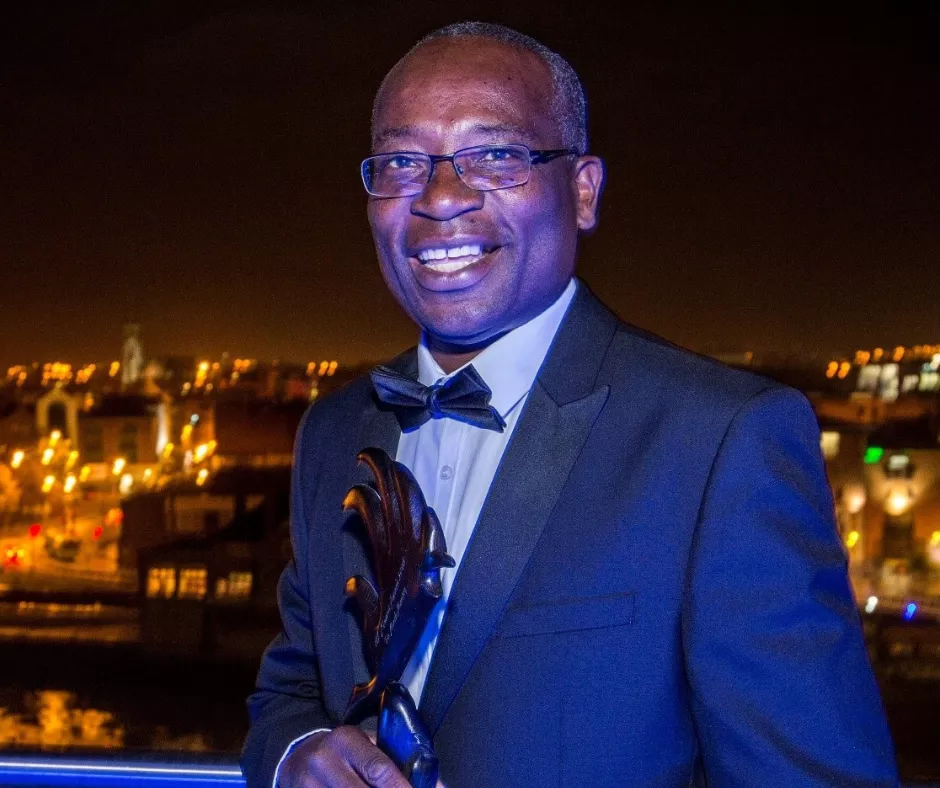

Mark Moses Mantey was born and raised in a village near Ankaful, Cape Coast in the Central Region of Ghana, West Africa. His parents worked hard to provide him with an education and with the support of religious orders he managed to complete his second level education. Due to an extraordinary act of generosity from Fr Patrick Seaver in Limerick, Mark was funded to undertake his third level education at the University of Limerick starting in 2001 as a mature international student. He graduated with a Bachelor of Arts in Public Administration in 2005, a Master's Degree in Public Administration in 2006 and a PhD in 2012. Mark believes his UL education and experience has made a huge impact to his working life, allowing him to make a difference for communities in Ghana and across Africa.
In 2004, while a student at UL, Mark helped to establish “Ghana Engage” projects at UL, including a Cooperative Education placement initiative bringing undergraduates from UL to Ghana for six months stints. He now oversees this programme (for which UL won a National Employability Award) with more than 80 Irish students from different disciplines having worked to-date as volunteers under the programme.
During his time at UL, Mark worked at the University’s Quality Unit (2007) to provide help, guidance and assistance to departments undertaking quality review processes and working towards quality improvements. He provided administrative support for University quality reviews and says “this experience is making a huge impact in his work life in Ghana”. Mark also mentored many African students during their time in UL and helped them become a supportive community, founding the Ghana-Irish Friendship Society.
Since returning to Ghana in 2012, Mark was the project manager for the British National Lottery and Charities Board funded project for the redevelopment of the Leprosy Survivors Village near Ankaful where 80 new homes were built under the scheme. This village is now called Enyinndakurom, ‘a place beyond our dreams’. He also worked as assistant hospital administrator at St Francis Xavier Hospital, Assin Foso, Central Region, Ghana and while there, was the team leader who investigated into the causes of maternal mortality at the hospital.
Today, Mark is the Executive Director of the Padre Pio Rehabilitation Centre (PPRC), an agency whose work is primarily based around the rehabilitation and reintegration of Leprosy Survivors and their families. PPRC also operates a day-care centre for children and young adults with special needs, a Family Support Centre (residential and outreach) and a long-term nursing care centre for elderly leprosy survivors. At PPRC, Mark provides day-to-day leadership and management, reviewing the on-going sustainability of the centre, managing budgets, implementing strategy and improving policy, process and procedure, in conjunction with key stakeholders. He is committed to the mission of the Centre - to ‘provide a safe place for those for whom society says there is no place- the marginalised and those in need’.
Outside of PPRC, Mark works as a management consultant (helping organisations, especially religious congregations and village communities) and as a Researcher (working with NGO’s and promoting good governance). Mark is respectfully referred to as “Senior” by the community in which he works and lives, a reference to his leadership and vision for his community.
Mark’s other interests are football, music and particularly, politics (an interest which he says came from his parents who were greatly interested in the evolving nation of Ghana from when it became independent in 1957). Married to Gladys, they have four children: Joe, Mark, Linda and Rita who also studied at UL, graduating with a Master Degree in Project Management in 2013. Also, Mark’s sister, Rose, a nurse and midwife, has worked with the UL Department of Nursing and Midwifery and hosted midwives at the Mercy Hospital, Mankessim, Ghana.
Maintaining his close ties with UL, Mark is the University’s representative in Ghana and continues to raise and enhance the public profile of his alma mater in West Africa.
 Student Centre (SU-101)
Student Centre (SU-101)
University of Limerick
Limerick, Ireland
Phone: 353 61 202475
Email: ulaa@ul.ie